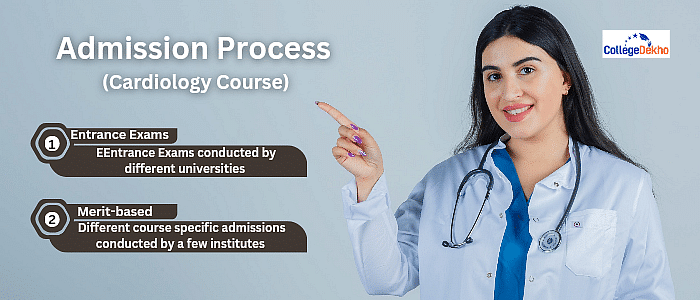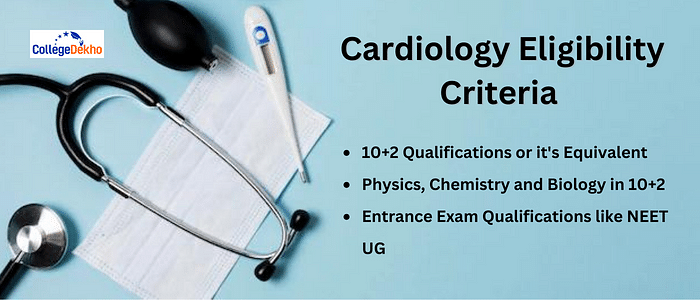Cardiology
Cardiology Overview
Cardiology is a specialization in the branch of internal medicine. It includes studies related to heart diseases and blood vessels. The duration of the Cardiology course is from 4 months to 5 years, depending on the academic level. There is no seperate undergraduate degree in Cardiology, Aspirants need to complete their MBBS degree before taking admission to cardiology courses. Interedted studehts may check out the Cardiology Syllabus and Subjects to grt an idea of the course curriculum. Cardiology course graduate professionals are equipped to carry out tests and perform procedures such as heart catheterization, inserting pacemaker, echocardiography, or angioplasty. They are different from cardiac surgeons who conduct surgeries for heart disorders. The syllabus of Cardiology courses includes core subjects such as Nuclear cardiology, Cardiac pathology, Pericardial diseases, Heart muscle diseases, and Cardiac molecular biology.
In order to be eligible for full-time cardiology courses, students need to appear for entrance tests like NEET-UG for undergraduate programmes and AIIMS PG or NEET-PG for MBBS and MD in Cardiology, respectively. Cardiology courses are generally offered in offline mode but there are certain online certification courses available. The top colleges in India for cardiology courses are AIIMS, PGIMER, and Christian Medical College. The course fee range is between INR 50,000 to INR 10 LPA. Apart from practicing as a cardiologist, there are various other Cardiology job roles that are offered to respective individuals, such as cardiovascular technologists and technicians. Depending on the work experience of individuals, the scale of Cardiology Salary may range from INR 2 LPA to INR 20 LPA.
Table of Contents
- Cardiology Overview
- Cardiology Course Highlights
- Why Cardiology Course?
- Cardiology Course Types
- Cardiology Admission Process
- Cardiology Course Eligibility Criteria
- Cardiology Course Entrance Exams
- Cardiology Course Syllabus
- Course Curriculum for Cardiology
- Top 10 Cardiology Courses in India
- Popular Cardiology Colleges in India
- Cardiology Course Fee
- Cardiology Scope in India - Career and Job Prospects
- Average Cardiology Specialist Salary
- Top Recruiters in Cardiology
- Skills Required to Become a Successful Cardiologist
- Study Cardiology Abroad
- FAQs about Cardiology
Cardiology Course Highlights
Check out the highlights of the cardiology course below:
| Name of the Course | Cardiology |
|---|---|
| Stream | Medical |
| Level of the Course Available | Bachelors, Certificate, Diploma, PG Diploma, Masters, Doctorate |
| Course Mode | Regular, Online |
| Course Duration | 4 months to 5 years |
| Exam Type | Semester Based |
| Admission Process | Merit Basis or Entrance Test |
| Fees Range | INR 50,000- INR 10 LPA |
| Career Options | Cardiologist, Cardiothoracic surgeon, Medical Sonographer |
Why Cardiology Course?
Selecting a specialization is very crucial as it will decide your career path as a doctor. Check out these reasons why students should choose a cardiology course:
- If students want a solid grounding in cardiac and vascular biology then they must opt for a cardiology course. They will get to know about cardiovascular science including myocardial biology, integrated physiology and vascular biology.
- Students can be part of a respected profession where they can utilise their specialized training. They will be acknowledged and held in high esteem by patients for helping them with their ailments.
- There is less job stress as surgeries are not involved in most of the degrees related to cardiology. Cardiology only involves evaluating the problem and finding out solutions through tests. However, those who have an MS in Cardiology can perform surgeries and this can be a little stressful.
- Cardiologists can create a serious impact on patients’ lives by helping them lead better lives. Often they have to resort to life-saving techniques in emergency situations such as heart attacks.
- There are good chances of career advancement. Apart from practicing in their cardiology specialization, students can go on to teach in medical colleges or help resident doctors learn how to treat patients with heart and cardiovascular diseases.
Cardiology Course Types
The Cardiology certification course can range from four to twelve months. It includes common approaches to cardiological complaints. The course content also contains ECG testing and interpretation, echocardiography, cardiac imaging and invasive cardiology.
The diploma courses are suitable for those who have completed 10+2 with a science background or candidates who are ECG technicians. MBBS doctors can also take up a short certificate program in Cardiology to extend their knowledge.
Diploma and PG Diploma Programmes in Cardiology
The course duration of a diploma and postgraduate diploma in Cardiology range from one to two years. It prepares students to practice in clinical or hospital settings. A variety of diagnostic procedures such as ECG, Stress Tests, and Holter Monitoring are taught under these programmes. Students also learn to monitor patients with heart problems. With a diploma, graduates can assist doctors and surgeons but cannot prescribe medicine.
Some of the popular diploma programmes are Diploma in Cardiovascular Technology, PG Diploma in Clinical Cardiological Course, PG Diploma in Community Cardiology and PG Diploma in Cardiac Pulmonary Perfusion Technology.
Bachelors in Cardiology Courses
Students who have completed class 12 examination with science as a subject can opt for courses such as BSc. in Cardiac Care Technology, BSc. in Cardiology or MBBS. The BSc. programme is for three years whereas the duration of MBBS is five years. BSc in Cardiology is focused on the extensive study of cardiovascular and thoracic science and the operation of cardiovascular technologies and equipment. On the other hand, with an MBBS degree, students learn how to treat patients suffering from cardiac diseases and perform life-saving surgeries.
Masters in Cardiology Courses
An MSc. in Cardiology or an MD with Cardiology as a specialisation can be done after completing undergraduate studies in a relevant subject. The MSc course is generally for two years, while the MD programme duration is three years. An MSc. degree concentrates on research and helps students to get a specialised understanding of various aspects of the field and tackle circulatory and cardiovascular disorders, narrowing of arteries or complications related to blood vessels and veins. An MD in Cardiology helps in the diagnosis of defects in the heart and its treatments, coronary artery diseases, failure of the heart, valvular heart diseases and narrowing of arteries.
Cardiology Admission Process
The admission process for cardiology programmes differs depending on the type of course or study level. Some admission processes are purely merit-based, whereas other courses may require students to appear for an entrance test. Mostly, admission to certificate, diploma, bachelor's and master's courses are based on merit. On the other hand, an entrance test is required for MBBS and MD courses.

Admission to Certificate Courses in Cardiology
Certificate courses in cardiology are built to enhance the potential of students in a short time. Thus, there are no specific scores or entrance exam requirements. Candidates can directly apply for this course by filling out an application form and submitting the necessary documents. After this, the concerned school or college may analyse candidate profiles. Candidates may be contacted for an interview.
Admission to Diploma in Cardiology Course
For a diploma in cardiology, colleges admit students mostly based on merit. Students can be selected based on their marks after the application forms have been filled. For undergraduate diplomas, scores of class 12 will be necessary. In the PG diploma course, you will require scores of both 10+2 and a bachelor’s degree.
Admission to Bachelors in Cardiology Course
The admission to bachelor's in cardiology can be based both on entrance exam as well as merit. Candidates may need to sit for the university entrance exam as a part of the admission process. Apart from this, colleges may conduct an aptitude test or a personal interview to understand the candidate’s profile. Some universities may also post a cut-off score for both merit and entrance-based admissions.
Admission to MBBS in Cardiology Course
The admission process to MBBS includes appearing for an entrance test, i.e., candidates have to qualify for NEET-UG conducted by NTA and attain a good rank. Students also need to be at least 17 years old at the time of admission. Based on NEET-UG scores and ranks, students can get admission to various government and private medical colleges.
Admission to Masters in Cardiology Course
Admission to master's courses also takes place based on merit and entrance test. The entrance exam for master's courses is conducted by respective universities. Certain universities grant admission based on the GPA obtained in a bachelor's course. Interview sessions may be conducted by certain medical institutes as part of the admissions process.
Admission to MD in Cardiology Course
Those aspiring to pursue MD in Cardiology have to qualify for entrance exams to get into the course. It is compulsory to complete a bachelor's in medicine degree and qualify for NEET-PG or AIIMS-PG. Practical experience is also taken into consideration for admission purposes. Universities conduct interviews or counselling sessions before placing candidates in respective colleges.
Cardiology Course Eligibility Criteria

Cardiology courses can be pursued by students upon completion of high school. It is generally pursued by students who have the interest to build a career in the medical field and technology and healthcare sector. The minimum requirements of the cardiology courses as per programme type are given below:
| Course | Eligibility Criteria |
|---|---|
| Certificate | Completed class 12 from a recognised institution with Science as a subject |
| Diploma | Completed class 12 from a recognised school board with Science as a subject |
| PG Diploma | Complete a bachelor’s degree from a recognised university with Cardiology as a subject |
| Bachelors | Complete 10+2 from a recognised board with at least 50% marks and Science as a subject. For the reserved category, at least 40% is required. Must have subjects in class 12: Physics, Chemistry and Biology |
| MBBS | Completed 10+2 studies with Science Must have subjects: Physics, Chemistry and Biology Qualify NEET-UG entrance exam |
| Masters | Complete a bachelor’s degree in relevant discipline with at least 50% aggregate. Must have overall 50% in higher secondary May require to sit for university entrance exam |
| MD | Complete MBBS degree with relevant practical experience Qualify NEET-PG entrance exam |
Cardiology Course Entrance Exams
Entrance examinations for cardiology courses differ as per the programme level or course. Some universities have separate medical entrance tests as a part of the admissions process. Some of the common entrance exams students need to take to be eligible for cardiology courses are:
Entrance Exam for MBBS in Cardiology
In order to pursue an MBBS degree in Cardiology course, one has to appear for:
NEET UG: National Eligibility cum Entrance Exam (undergraduate only)
JIPMER: Jawaharlal Institute of Postgraduate Medical Education and Research
AIIMS: All India Institute of Medical Sciences (undergraduate only)
Entrance Exam for MD in Cardiology
Those aspiring to do a specialisation in Cardiology after MBBS, have to take the following exams:
NEET-PG: National Eligibility cum Entrance Exam (postgraduate only)
AIIMS-PG: All India Institute of Medical Sciences (postgraduate only)
PGIMER: Post Graduate Institute of Medical Education and Research
Cardiology Course Syllabus
Cardiology courses may differ as per the university or institution, but the fundamentals taught remain the same. Some of the common subjects covered in the cardiology syllabus are:
| Cardiology Syllabus | |
|---|---|
| Cardiovascular diseases fundamentals | Cardiac biochemistry |
| Cardiac pharmacology | Cardiac anatomy |
| Cardiac physiology | Nuclear cardiology |
| Preventive cardiology | Cardiac artery diseases |
| Cardiac microbiology | Paediatric cardiology |
| Coronary artery diseases | Heart failure |
| Congenital heart diseases | Systemic hypertension |
| Pericardial diseases | Geriatric heart diseases |
| Genetics | General anaesthesia |
| Invasive cardiology | Non-invasive cardiac technology |
Course Curriculum for Cardiology
The course curriculum for cardiology is designed in a way that gives maximum knowledge about cardiovascular diseases. The course is divided into semesters and can last from two to ten semesters. Here is a detailed curriculum for the cardiology course based on a few topics of the syllabus:
| Cardiology Syllabus | Contents |
|---|---|
| Fundamentals of Cardiovascular Diseases |
|
| Preventive Cardiology |
|
| Cardiac Anatomy |
|
| Cardiac Pathology |
|
| Cardiac Failure |
|
Top 10 Cardiology Courses in India
Cardiology course is one of the most sought after courses among the students after they have completed their higher secondary education. Here is the list of the top 10 cardiology courses in India that are taken up by thousands of students each year:
| Course Name | Average Duration | Average Course Fee |
|---|---|---|
| Post Graduate Diploma in Cardiovascular Technology | 2 years to 2.5 years | INR 4 LPA to INR 12 LPA |
| B.Sc in Cardiology and Thoracic Science | 3 years to 4 years | INR 3.5 LPA to INR 8 LPA |
| Post Graduate in Cardiac Laboratory Technology | 2 years to 2.5 years | INR 2.5 LPA to INR 10 LPA |
| Post Graduate Diploma in Cardiology | 2 years to 2.5 years | INR 3.5 LPA to INR 7.5 LPA |
| MD Cardiology | 3 years to 3.5 years | INR 8 LPA to INR 25 LPA |
| B.Sc in Cardiac Care Technology | 3 years to 4 years | INR 5 LPA to INR 20 LPA |
| Post Graduate Diploma in Clinical Cardiology | 2 years to 3 years | INR 4 LPA to INR 10 LPA |
| M.Ch Cardiology Vascular and Thoracic Surgery | 3 years to 3.5 years | INR 8 LPA to INR 19 LPA |
| Interventional Cardiology | 2 years to 2.5 years | INR 6 LPA to INR 20 LPA |
| MSc in Cardiology and Strokes | 2 years to 3 years | INR 15 LPA to INR 25 LPA |
Popular Cardiology Colleges in India
Every Indian state features medical colleges and universities that offer various cardiology courses at all study levels. According to NIRF Ranking, some of the top colleges in India offering cardiology courses are:
| Medical Institutes | State | NIRF Score |
|---|---|---|
| All India Institute of Medical Sciences | New Delhi | 92.07 |
| Post Graduate Institute of Medical Education and Research | Chandigarh | 82.62 |
| Christian Medical College | Tamil Nadu | 75.33 |
| National Institute of Mental Health & Neuro Sciences | Karnataka | 73.62 |
| Sanjay Gandhi Postgraduate Institute of Medical Sciences | Uttar Pradesh | 72.45 |
| Amrita Vishwa Vidyapeetham | Tamil Nadu | 69.25 |
| Banaras Hindu University | Uttar Pradesh | 67.62 |
| Jawaharlal Institute of PostGraduate Medical Education & Research | Pondicherry | 67.42 |
| King George's Medical University | Uttar Pradesh | 64.67 |
| Kasturba Medical College, Manipal | Karnataka | 63.60 |
Cardiology Course Fee
The cardiology course fees vary as per the level of study, course type and type of institution. While the cost of education is relatively low in government colleges, on the other hand, private institutions usually charge more tuition fees. The average course fees for cardiology are given below:
| Cardiology Course Type | Average Annual Cardiology Fees |
|---|---|
| Certificate | INR 5,000 - INR 50,000 |
| Diploma/PG Diploma | INR 10,000 - INR 1 LPA |
| Bachelors | INR 1 LPA - INR 10 LPA |
| Masters | INR 1 LPA - INR 25 LPA |
Cardiology Scope in India - Career and Job Prospects
The cardiology courses are beneficial to students as it opens up numerous job opportunities. Cardiology experts and surgeons are always in demand and there is a lot of scope in this field. Some of the top job profiles for individuals pursuing cardiology courses are:
Cardiologists: One can practice as a cardiologist in government and private sector hospitals or start their own practice. They are associated with the diagnosis, prevention and care of patients with cardiac disorders.
Cardiac Surgeons: Cardiac surgeons perform heart-related surgeries and other complex operations on patients. They are the ones who interpret injuries related to the heart and circulatory system.
Invasive Cardiologists: They are the specialists who use invasive procedures to treat heart procedures.
Cardiovascular Technologists: They are technicians who use a variety of tools and techniques for the diagnosis and management of heart diseases.
Scientists: The researchers and scientists perform in-depth research on cardiac health and diseases.
Echocardiographer: Cardiosonographers or echocardiographers are professionals who use imaging technologies to help physicians diagnose diseases in patients.
Average Cardiology Specialist Salary
The salary of cardiology specialists is dependent on the course they have done, experience and skill set. With experience, the salary keeps increasing. Here is a list of salaries of professionals as per degree:
| Cardiology Degree | Average Annual Salary (in INR) |
|---|---|
| Certificate | 2 LPA-3 LPA |
| Diploma | 2 LPA-5 LPA |
| Bachelors | 3 LPA-15 LPA |
| Masters | 5 LPA-20 LPA |
Top Recruiters in Cardiology
Some of the major recruiters of Cardiology course graduates are mentioned below in the table:
| Indian Council of Medical Research | AIIMS (All India Institute of Medical Science) |
|---|---|
| Indian Railway Medical Services | Military healthcare hospitals/institutes |
| State Public Service Commission | National Rural Health Mission |
| Government hospitals | Government medical colleges |
| Private hospitals | Private Clinics |
Skills Required to Become a Successful Cardiologist
As a cardiology practitioner, individuals are expected to have in-depth knowledge on cardiology as well as must have other soft skills that ensure that patients are provided with best treatment and care. They must be open to all new medical and scientific advancements related to cardiology. The other qualities that they must possess are:
| Detailed knowledge of modern cardiological technologies and equipment | Attention to detail to treat patients, strong listening skills and diagnostic abilities |
|---|---|
| Compassion and care | Proper time management skills |
| Confidence to deal with this complicated stream of medicine | - |
Study Cardiology Abroad
Studying cardiology abroad helps students get top-notch classroom training and hands-on experience that help them stand out from the rest of medical students. Those who wish to study cardiology courses abroad can check out these top medical schools abroad:
| University/College | Country |
|---|---|
| University of Leeds | United Kingdom |
| Trinity College Dublin | Ireland |
| Middlesex University | United Kingdom |
| University of South Australia | Australia |
| University of Georgia | United States |
| Memorial University of Newfoundland | Canada |
| Imperial College London | United Kingdom |
| University of Gottingen | Germany |
| Columbia University | United States |
| University of Toronto | Canada |
FAQs about Cardiology
Can I study cardiology after 12th?
Yes, you can study cardiology after 12th. You can choose to pursue a bachelor's in Cardiology or an MBBS course. You can also obtain a certificate or undergraduate diploma in cardiology after 12th. The minimum course duration is six months whereas higher studies in cardiology may take up to 3 to 5.5 years.
Is BSc Cardiology a doctor?
No, BSc Cardiology is not a doctor. BSc in Cardiology provides you with entry-level knowledge of the course and the associated cardiac technologies. You will have to complete MBBS to be a doctor and later, you will have to do a specialised doctor of medicine (MD) course in cardiology to perform the roles of a cardiologist.
What is the difference between MS in Cardiology and MD in Cardiology?
Aspirants who have done MS in Cardiology can perform surgical operations to treat cardiac and cardiothoracic disorders whereas MD in Cardiology allows non-surgical procedures of treatment. An MD in Cardiology will allow the doctor to prescribe medicines, and provide treatment and care to heart patients.
What is the minimum qualification to study Cardiology?
The minimum qualification to study Cardiology is at least 50% in class 12 for general candidates and 40% for reserved candidates. Also, students must have studied physics, chemistry and biology in their class 12 to pursue a cardiology course at the undergraduate level. Moreover, those who aspire to become doctors must qualify for the cut-off in the NEET-UG and other entrance examinations for the MBBS course.
Can I study Cardiology online?
Yes, there are certain certificate cardiology courses that you can pursue online. The popular websites that provide online courses are Udemy, EDX, and Coursera. One can sign up for short-term courses on these websites. However, diplomas, bachelor's, and master's courses have to be pursued offline through classroom study mode and laboratory experiences.
What are the various specialisations of Cardiology?
The various specialisations of Cardiology are non-invasive cardiology, invasive cardiology, adult cardiology, paediatric cardiology, coronary artery diseases, cardiothoracic, vascular surgery and cardiac electrophysiology. These are the most popular specialisations that students can select on the basis of opportunities available to them and their interests in the particular field.
What are the job options after BSc in Cardiology?
There are plenty of job options for students after a BSc in Cardiology. The job roles that they can apply for are:
-
Cardiovascular Technologist
-
Echocardiographer
-
Cardiac Care Technician
-
Medical Sonographer
-
Cath Lab Technologist
These job roles provide high salaries and there is high demand for such professionals in the medical market.
Does MSc Cardiology require NEET?
No, NEET scores are not necessary for MSc in Cardiology. Only those who will pursue MBBS, MD or MS in Cardiology are required to appear for NEET. That said, those who are aspiring to study MSc in Cardiology will have to get at least 50% marks in the bachelor's course to be eligible to apply for master’s courses.
Is studying Cardiology a good option?
Yes, studying cardiology is a good option for students with a science background. You will get a good salary package as per specialisation and experience. There is also high demand for professionals in the field of cardiology. Moreover, the best part is the respect earned in society and the job satisfaction you get while treating patients.
Is cardiology a difficult course?
Yes, cardiology is a difficult and challenging course as it is related to the medical field. However, it should not discourage you from pursuing the course as there are lots of scope and opportunities after completion. You also need to be hardworking, compassionate and skilful to treat or provide care to heart patients.
Related Questions
Popular Courses
- Courses
- Cardiology


















